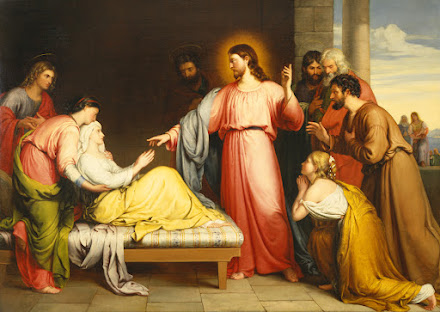The crowds went looking for him, and when they came to him,
they tried to prevent him from leaving them.
One might have expected that Jesus would have desired to stay longer in Capernaum. It seemed as though he had a good thing going. The response recorded was entirely positive, and in that way entirely opposite of what he encountered in Nazareth. In Nazareth the lack of faith made it so that "he did not do many mighty works there, because of their unbelief" (see Matthew 13:58). At Nazareth they "drove him out of town" (see Luke 4:29) but in Capernaum "they tried to prevent him from leaving". Had Jesus been operating in a merely human mode, like a fleshy person or infant described by Paul, he probably would have settled in and enjoyed his success. But just as Paul insisted that his audience show no favoritism to teachers Jesus himself showed no favoritism to audience.
But he said to them, “To the other towns also
I must proclaim the good news of the Kingdom of God,
because for this purpose I have been sent.”
There was something greater at stake, something which compelled Jesus to travel widely, scattering the seed like the sower in his parable, in places where the reception to his message was warm and welcoming but also in places where the response was hostile. What Jesus sought was not the validation of a job well done. Nor did he seek to avoid uncomfortable encounters and negative responses. He sought rather to spread the Kingdom. This was what he had accomplished in Capernaum.
Simon’s mother-in-law was afflicted with a severe fever,
and they interceded with him about her.
He stood over her, rebuked the fever, and it left her.
She got up immediately and waited on them.
Simon's mother-in-law was just one example of the ways in which the kingdom of darkness was forced to withdraw, was in fact expelled from the strongholds it once enjoyed in Capernaum. Neither disease nor demons were any match for the authority of the word of Jesus. His rebuke could chase away fever and demons with equal ease. No storm was a match for the peace with which he spoke. His healing hands claimed for the Kingdom of light many who had previously been captive in the kingdom of darkness. Demons fled screaming at his touch, for they could not withstand him.
And he was preaching in the synagogues of Judea.
Jesus desired more than mere worldly success, and had little interest in the adulation of his followers. He was, however, utterly intent on establishing the Kingdom on earth. His life was synonymous with the petition, "Thy Kingdom come". The coming of that Kingdom implied the destruction of the kingdom of darkness, and so it was also said that the "reason the Son of God appeared was to destroy the works of the devil" (see First John 3:8).
How can we learn to keep our priorities as perfectly straight as Jesus held his own? How can we learn to yield to what seems humanly successful, to not fear what seems humanly difficult, in favor of the mission to which we are called? Jesus left us an example. We must follow him to "a deserted place" and pray. We must step away from the influence of the crowd, whether that is positive or negative, and open ourselves more completely to the influence of the Father, just as Jesus himself demonstrated.
I planted, Apollos watered, but God caused the growth.
Therefore, neither the one who plants nor the one who waters is anything,
but only God, who causes the growth.
We tend to imagine we're important in the wrong ways and to downplay ourselves in the ways that we are actually important. We focus on the importance of seeing good results and fear bad ones. But our importance is not about what we can or cannot bring to completion, as though everything depended on our own strength or abilities. Our importance is precisely for the part of the mission that is uniquely our own. It may be hidden or it may be public. It may seem impressive or trivial. All of that is inconsequential. What matters is that we remain open to the dynamic call of the living God, that we remain free to go wherever he calls.
Our soul waits for the LORD,
who is our help and our shield,
For in him our hearts rejoice;
in his holy name we trust.






.jpg)





_-_James_Tissot.jpg)